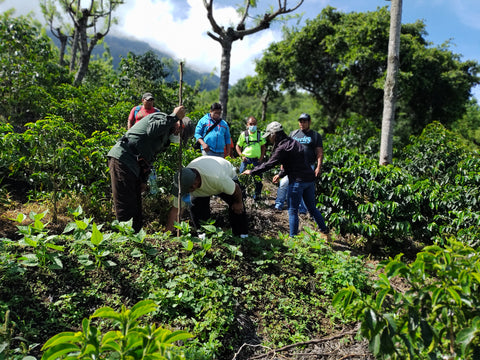Produced by smallholder farmers of the Esquipulas co-operative in Huehuetenango, Guatemala, in conditions about as perfect as you can get - a high altitude over 1,500 MASL, fertile soil, and glorious sunshine. We’ve been working with the Esquipulas co-operative since 2009 and in that time we’ve seen them grow significantly, now working with more than 230 smallholder farmers. The farmers grow on average 1 hectare of coffee, alongside subsistence crops such as maize and beans.
Each farmer pulps, ferments and washes their coffee at home, then delivers samples to the co-operative to be roasted and cupped by trained cuppers. Only the highest-quality coffee is selected for Union. The farmers are given feedback based on the cupping results on how to further improve quality through attention to post-harvest process. Iliana Martinez, the General Manager of the Esquipulas Cooperative highlighted why producing high-quality coffee is so important to their co-operative:
“When we visit communities that are so poor, and we see how the world market takes advantage of them - it motivates us to work hard. Coffee is the most important crop in Huehuetenango, it moves the economy (whether prices are low or high). Producers had no idea what quality coffee is, or that quality could be the solution. We needed to develop a program of teaching and training to help people understand how they should grow high-quality coffee.”
The Esquipulas co-operative doesn’t just provide guidance in producing high-quality coffee but plays an important role in the general development of the area. They operate a health care centre and pharmacy which provides services to community members at subsided costs. They also employ agronomists who monitor the coffee fields of the members, providing assistance when needed. With ~40 employees, the co-operative is also an important source of employment in the area.
February 20, 2019


